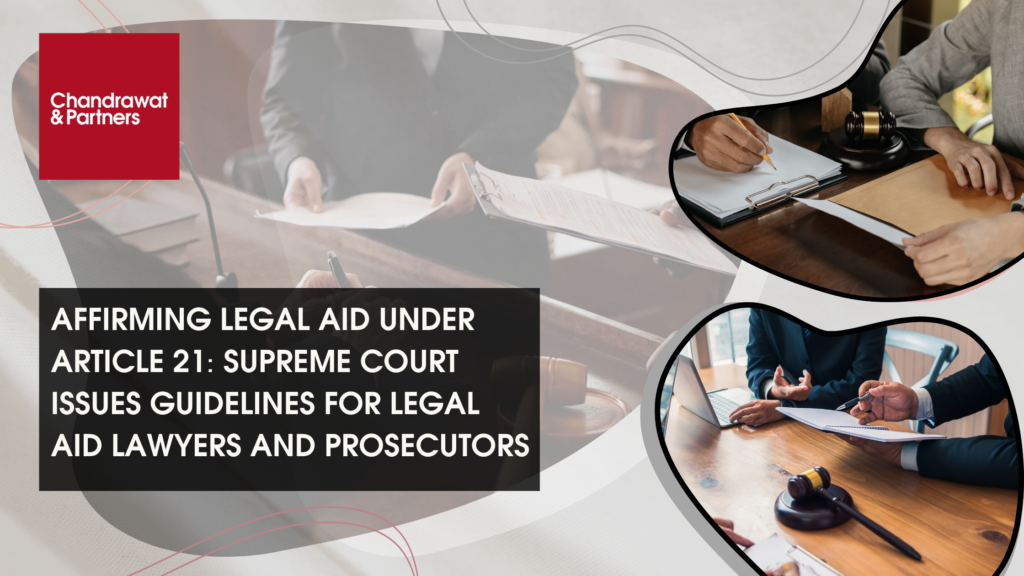Home > Recent Judgements > Affirming Legal Aid Under Article 21: Supreme Court Issues Guidelines For Legal Aid Lawyers And Prosecutors
DEC 03, 2024

ENSURING JUSTICE THROUGH LEGAL AID UNDER ARTICLE 21
The Supreme Court in its recent judgement Ashok Versus State of Uttar Pradesh, laid down guidelines for lawyers, prosecutors to provide free and compulsory legal aid to the accused, ensuring a fair trial and safeguarding the fundamental rights enshrined under Article 21 of the Constitution of India. Article 21 protects a person’s right to life and personal liberty, and is an inalienable right i.e., it cannot be suspended even in case of Emergency.
WHAT IS FREE LEGAL AID?
Legal Aid was introduced in India by the Legal Services Authorities Act, 1987. The act establishes Legal Service Authorities at the National, State and District level to ensure free legal aid, spread legal awareness, organizing Lok Adalat’s and facilitate peaceful settlement of disputes. The purpose of the Act was to fulfil the goal of Article 21 of the Constitution, while also implementing Article 39A of the Directive Principles of State Policy under Part IV of the Constitution, which guarantees equal justice and free legal aid to all citizens.
PARTICULARS OF THE CASE
The accused, in this case, was sentenced to capital punishment by the trial court under Sections 376, 302 and 201 of the Indian Penal Code (“IPC”) which deal with rape, murder and destruction of evidence respectively. The High Court on appeal, affirmed the trial court’s decision while reducing the sentence to life imprisonment. The accused further appealed before the Supreme Court to seek reduction in sentence, stating that he was not made aware of the incriminating evidences against him and was not provided a lawyer for a fair trial.
ISSUES
- Whether the accused was informed of his right to free legal aid at all material stages of the trial, including during the remand and framing of charges?
- Whether the Trial Court ensured that the accused was provided with effective legal representation as guaranteed under Article 21 of the Constitution of India?
- Whether the Public Prosecutor fulfilled their duty to ensure procedural fairness by assisting the Court in providing legal aid to the accused and ensuring all incriminating evidence was presented under Section 313 of the CrPC?
- Whether the absence of competent legal aid for the accused violated his fundamental rights and resulted in a miscarriage of justice?
SUPREME COURT’S RULING AND GUIDELINES
The Supreme Court relied on the landmark ruling of Hussainara Khatoon (IV) v. Home Secy., State of Bihar and acquitted the accused due to lack of legal representation in trial court and High Court. The full-judge bench also laid down the following guidelines for lawyers to ensure legal aid:
- The court has a duty to ensure free legal aid for all accused persons.
- The public prosecutor has a duty to point out any lack of legal representation for the accused.
- The public prosecutor has such duty even when the court is inclined to record examination-in-chief (process in which a party to a trial question their own witness under oath) in cases where the accused has not engaged any lawyer.
- The Public Prosecutor must assist the court while recording the statement of the accused under Section 313 of the code of criminal procedure (“CrPC”). The public prosecutor has a duty to make sure the accused is punished for his wrongs but must also ensure that the trial is free and fair.
- Free legal aid must be made available at all stages starting from remand.
- The court must make the accused aware of his right to free legal aid at all stages.
- If the charges on the accused are serious in nature, a competent advocate must be appointed who has a proper knowledge of law. It may even appoint a senior advocate of the bar. The legal services authorities must train the lawyers to become competent for the same.
- The State legal services authorities shall issue directions to monitor the work of legal aid lawyers at all levels.
- The same legal aid advocate must continue throughout the trial unless the accused does not appoint his own advocate.
- A trial without legal representation would be an infringement of the Fundamental Right under Article 21, and such trial must be considered invalid.
REAFFIRMING THE RIGHT TO LEGAL REPRESENTATION AS A FUNDAMENTAL GUARANTEE
The Supreme Court’s decision in the aforementioned case reinforces the constitutional mandate of free and fair trials, emphasizing that legal aid is not merely a statutory obligation but a fundamental right under Article 21. By outlining comprehensive guidelines for prosecutors, courts, and legal aid authorities, the judgment ensures that the principles of natural justice and equality before the law are upheld. It underscores that no accused, regardless of the charges, should be denied competent legal representation.
OBSERVATION
The Supreme Court observed that the right to legal aid and a fair trial are integral to the constitutional guarantee under Article 21 of the Constitution. The Court emphasized that the Public Prosecutor plays a crucial role in ensuring procedural fairness and safeguarding the rights of the accused, including assisting the Trial Court during the recording of the accused’s statement under Section 313 of the CrPC. It stressed that legal aid must be effective and provided by competent advocates, particularly in cases involving serious offences, to prevent prejudice against the accused and uphold the principles of justice.
For more information or queries, please email us at
enquiries@chandrawatpartners.com



